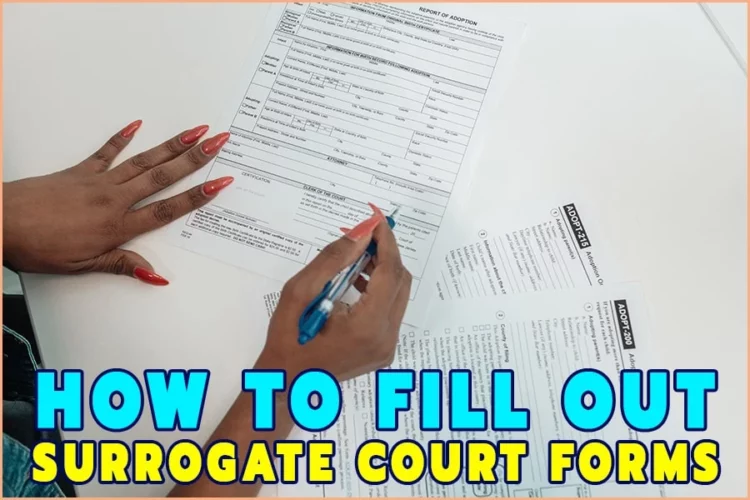A surrogate court is also known as a probate court. It’s a type of court that deals with probate matters and estates administration.
Today people are dying from various causes such as accidents, diseases, etc. Therefore most people need the court system to handle the estates of their dead family members. The process is more complex than before.
Most courts have been affected by budget restraints and work with limited resources and staff. So if you are a person of limited means, how will you file to handle your family member’s estate? Here is a detailed answer to the question.
How to Fill Out Surrogate Court Forms
People hire attorneys to file petitions on their behalf—however, those who don’t afford attorneys can file the petition themselves. The forms are usually available at the surrogate court website.
You’ll have to select the county where your descendant lived when accessing the forms. You then fill out the petition and attach supporting documents. Note that you have to file the forms in the respective court.
Additional Information
Since the COVID outbreak, most courts have been operating with limited resources. Therefore you must go to the respective court and check out their instruction. Amazingly most information is available online and will help guide you on how to file.
People who file their petitions themselves are self-represented litigants or pro se litigants. A pro se litigant can file the paperwork in different ways. It can be through mail, e-filing at the website, or dropping it off at the surrogate courthouse.
The court staff will then review and process the paperwork. However, the COVID outbreak has led to more deaths. So courthouses have been getting an overwhelming number of cases.
Therefore, reviewing and processing paperwork takes longer than usual. You’ll have to be patient.
But if you need the court to handle your case faster, you can file an affidavit of urgency. It informs the court that you need the issue done immediately.
However, note that it’s up to the judge to decide whether your case needs immediate action.
In addition, as a pro se litigant, you need to have a great understanding of law and procedure. The court clerks don’t offer any legal advice to those representing themselves. For that reason, you must have a good understanding of the law.
Plus, you should know how the law applies to your specific case
The Common Proceeding In Surrogate Courts
Probate
It is a process where the surrogate proves the will is valid.
Administration
It’s simply the procedure of identifying, collecting, and sharing an individual’s estate that died without an interstate.
Voluntary Administration
The process of voluntary administration is simple and inexpensive. It applies to a personal decedent’s assets that aren’t more than $50,000.
It’s exclusive to certain properties, and the court clerk can offer you more information about whether you qualify. However, note that voluntary administration isn’t applicable in the administration of real property.
Guardianship
Guardianship is among the functions of surrogate courts. There are several types of guardianships that this court can handle. They include:
Guardianship over an infant
An infant is a child below 18 years and or property. In this setting, the guardian is usually a family member. The court grants them powers to take care of and make huge decisions for the child.
Anytime a child gets money that’s more than $10,000, the court formally appoints a guardian. The guardian’s role is to safeguard the money until the child is of age (18 years). Usually, the court appoints the parent (natural guardian) to help manage the funds.
Guardianship (mentally retarded and disabled)
The surrogate court appoints a guardian for individuals that can’t care for themselves because of disability or mental retardation.
However, at least two doctors must confirm the person has any of the issues. Of the doctors, one should be a medical doctor and the other a licensed psychologist. Therefore, the guardian will decide on behalf of the person.
Trusts
The probate court has the power to handle different types of trust, which include:
- Testamentary trusts arise after the testator’s death and are usually under their will.
- Inter Vivos trusts: Its creation is during the settlor’s lifetime.
Adoptions
There are different types of adoptions that the surrogate court handles.
- Foreign adoptions: USA has a policy that allows USA citizens to adopt foreign children. The adopting person might benefit from wanting the child to have a US birth certificate.
- Adult adoption: It’s when the adopted person is more than 18 years old.
- Infant adoptions: Such adoptions happen directly between parties. Alternatively, a private adoption agency can help.
- Remarriage or parent/step-parent adoptions: The birth parent adopts a new spouse or partner. Or it can be with a prior adoptive parent.
- Family adoptions: these adoptions mostly refer to grandparents’ adoptions.
What Is A Will?
It’s simply a declaration of what an individual wants to do with their property after death. An individual that dies and leaves a will has died “testate.” However, the will must follow certain formalities for it to be valid.
A valid will has powers to transfer interest in both real estate and personal property. Personal property includes stocks, furniture, bank accounts, and clothing. One can name a trusted individual as guardian over the children and an estate executor in the will.
It also offers protection for family members.
What Happens If A Person Dies Without A Will?
Any individual that dies without a will has died “intestate.” The deceased individual didn’t leave a clear direction for disposing of the assets.
However, the law offers guidance on distributing the assets among living members of the decedent’s family.
The relatives will have to file an administration petition. In addition, they must file a death certificate and other important documents at the court.
The petition filling should be in a surrogate court where the decedent had a residence. A filing fee is applicable, depending on the estate size.
Overall, it’s advisable always to seek counsel assistance.
Does One Need An Attorney In Inheritance Case?
Most people are usually nervous when it comes to hiring an attorney. For sure, an attorney will help save your family’s money. However, note that there are several things that an attorney has to confirm first.
For example, they will check whether the descendant left assets worth probate.
The attorney must meet the client (executor). The client must produce information about the decedent’s assets and current value in the meeting. Plus, additional information on how the assets are titled.
A careful review of the assets by the attorney and executor can help avoid unnecessary probate of a will.
In summary, you should take the time to review the decedent’s records carefully. Check out their brokerage and bank statements, deeds, insurance policies, recent tax returns, etc.
You should then bring the information to your meeting with the attorney. It’ll surely help save time and resources.
Frequently Asked Questions (FAQs)
1. How can one get a death certificate copy?
Normally the funeral director buys several original copies for use. You can also get copies from the death/statistic records department.
That’s in the municipality where a person did die. In some states, you can contact the department of health.
2. Is it possible to get guardianship over a child and their property?
Yes, surrogate courts offer forms and will guide you on how to fill them. However, you must file the child’s original birth certificate and other relevant information. Note that there’s a filing fee of $20.
If the court proves everything to be correct, you can get guardianship.
3. Is it possible for a surviving spouse not on their husband’s/wife’s will to get something?
Generally, the spouse can file for a “Right of Election.” It entitles them to a share of their husband/wife’s estate.
However, filing for a “Right of Election” should be done within six months. Do not do that later than two years after your spouse’s death.
4. What proceedings should one file if their mother died in a nursing home?
If the values of the asset or total assets are under $50000, then you might file small estate proceedings.
If the value is more than the appropriate momentary amount, you should file a full probate proceeding or administration.
5. What should one do if their parent dies and their only asset is a house?
If a parent dies and their only asset is a house, then it’s not necessary to file a proceeding in surrogate court.
According to law, real estate property is for the children after the parent’s death. If the parent died without a will and didn’t have a spouse, then the property is automatically for the children.
6. Is it possible to admit the will to probate for the will’s executor?
The person must file the original death certificate and will alongside the probate petition. They can include other supporting documents.
You should file to the court located in the place where the decedent did reside. Note that you’ll have to pay a filing fee which depends on the estate’s size.
Conclusion
Don’t you know how to fill out the surrogate court forms? Worry no more; there are several ways to fill it. But firstly, you should get it from the surrogate court website.
You can then hire an attorney who will fill the form on your behalf and submit it. Alternatively, you can fill it out yourself if you don’t have enough money for an attorney.










